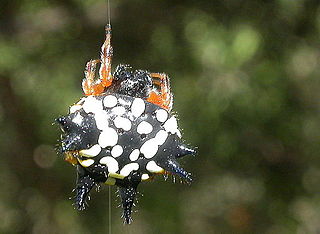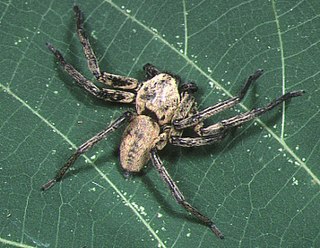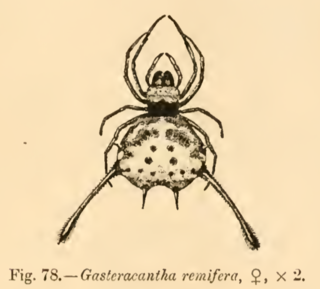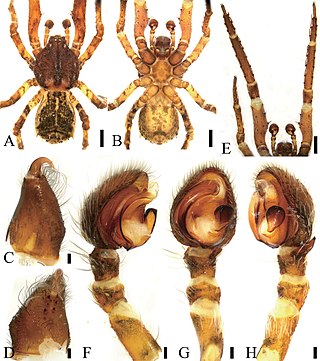
Austracantha is a genus of spider with a single species, Austracantha minax, commonly known as the jewel spider or the Christmas spider. It is a member of the family Araneidae and is endemic to Australia. They are relatively small spiders, reaching a maximum total body length of only around 12 mm (0.47 in) for females, and 5 mm (0.20 in) for males. Their abdomen has six distinctive projections ("spines") that makes them easy to identify. They are predominantly a shiny black, with variable white, yellow, and orange patterns. Melanistic forms also occur during autumn. They are facultatively gregarious, and can be found in large aggregations of overlapping orb webs. They feed on small flying insects that get entangled in their webs. They are harmless to humans, though the webs can be a nuisance for bushwalkers. They are most abundant during the summer months.

Gasteracantha is a genus of orb-weaver spiders first named by Carl Jakob Sundevall in 1833. Species of the genus are known as spiny-backed orb-weavers, spiny orb-weavers, or spiny spiders. The females of most species are brightly colored with six prominent spines on their broad, hardened, shell-like abdomens. The name Gasteracantha is derived from the Greek gaster (γαστήρ), meaning "belly, abdomen", and akantha (άκανθα), meaning "thorn, spine". Spiny-backed orb-weavers are sometimes colloquially called "crab spiders" because of their shape, but they are not closely related to the true crab spiders. Other colloquial names for certain species include thorn spider, star spider, kite spider, or jewel spider.

Rhene is a spider genus of the family Salticidae.

Chrysso is a genus of comb-footed spiders that was first described by Octavius Pickard-Cambridge in 1882.

Thelcticopis is a genus of huntsman spiders that occurs almost exclusively in the area India to Japan to New Guinea and Fiji. However, one species occurs in Costa Rica, and another in Congo basin, although the latter species is probably misplaced in this genus.

Cyrtophora parangexanthematica is a species of tent spider found in the Philippines. Its scientific name comes from its close resemblance to double-tailed tent spiders. It was described from a single female specimen collected in 1995.

Gasteracantha remifera is a species of spiny orb-weaver spider in the genus Gasteracantha. It is found in Sri Lanka and India, and it has a pair of long, club-shaped spines on its abdomen.

Borboropactus is a genus of crab spiders that was first described by Eugène Louis Simon in 1884.
Landoppo is a monotypic genus of Filipino comb-footed spiders containing the single species, Landoppo misamisoriensis. It was first described by A. T. Barrion & J. A. Litsinger in 1995, and is found in the Philippines.

Ebrechtella is a genus of crab spiders that was first described by Friedrich Dahl in 1907.

Gasteracantha kuhli is a species of spiny orb-weaver spider in the genus Gasteracantha, widespread from India to Japan, the Philippines, and Java in Indonesia. It is known as the black-and-white spiny spider.

Gasteracantha clavatrix is a species of spider of the genus Gasteracantha. It occurs in Indonesia.

Gasteracantha diardi is a species of spider in the spiny orb-weaver genus Gasteracantha. It occurs in Southeast Asia.

Gasteracantha mengei is a species of spider in the spiny orb-weaver genus Gasteracantha. Its range includes Peninsular Malaysia, Singapore, Borneo, and Sumatra in Indonesia.

Gasteracantha quadrispinosa, the four-spined jewel spider, is a brightly coloured species of spider in the spiny orb-weaver genus Gasteracantha. It occurs in wet forests of Queensland, Australia, and New Guinea, where it builds vertical orb webs approximately 1.5 m across and hangs in the centre of the web to wait for prey.

Gasteracantha westringi is a species of spiny orb-weaver spider in the genus Gasteracantha. It is found in Australasia, including New Caledonia and Norfolk Island, and it has a wing-shaped abdomen armed with red and black spines.

Gasteracantha gambeyi is a species of spiny orb-weaver spider in the genus Gasteracantha. It was described from New Caledonia.

Gasteracantha interrupta is a species of spiny orb-weaver spider in the genus Gasteracantha. It is black and white in color, and it occurs in the Lesser Sundas and Sulawesi in Indonesia.

Gasteracantha recurva is a species of spiny orb-weaver spider in the genus Gasteracantha. It was described from Manila, Philippines in 1877.

Gasteracantha hecata is a species of spider in the spiny orb-weaver genus Gasteracantha. It occurs in the Philippines and has prominent horn-like spines on its abdomen.




















